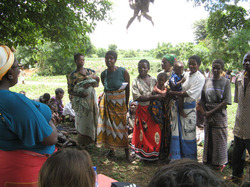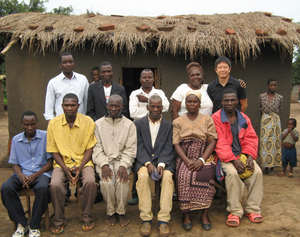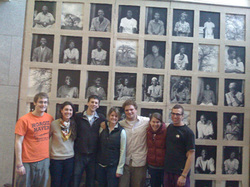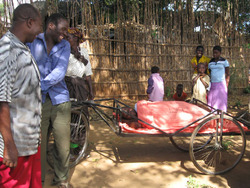DAY 2: WE CONFRONT WITCHCRAFT AND DON'T DO SO WELL
Something's Afoul In Our Perfect Village
For several years, our Face-to-Face AIDS Project has visited an umbrella organization called Luzi Community Based Organization (Luzi CBO) that operates in an expansive rural district an hour's drive outside of Lilongwe. This area of Malawi has undulating maize fields, green and verdant in the wet season and parched and dusty in the long dry season. Remote and isolated, many young children in Luzi have never seen a white person.
In 2008, we began a funding project with Luzi when we connected a student group from Colby College in Maine with a Luzi project comprised of a community cassava garden, a home-based care training program and a fleet of ambulance bicycles. A year later, we filmed ourselves gnawing on cassava and observing an ambulance bicycle carrying a person through a village.
But amid this showy display of promise, Mara Banda, our wise and trusted field office director, sensed that something was very wrong. And a few months later, the truth started coming out.
Worse Off With Our Help?
Mara found out that there was no cassava garden. The cassava we munched on was from a field owned by a village chief who'd been bribed. Also, instead of 20 ambulance bicycles, there were just three and they were in substandard condition. Finally, the list of home-based care participants was a complete sham. All the money raised by Colby College students had been misused and the fault lay with the leader of Luzi. I'll call him Mr. G.
Mr. G pilfered grant money. Communities didn't get the aid they were promised, poor families didn't participate in income-generating projects and orphans didn't receive their scholarships. Village chiefs and local leaders insisted that Mr. G exerted control over them. No one was happy.
Mara kept asking why others in Luzi hadn't overthrown Mr. G. The answer was that Mr. G. knew how to use witchcraft and his hexing power was stronger than anyone else's. Indeed, many people believed that confronting Mr. G would bring hardship on themselves and their families. Rumors started to swirl that Mara herself used witchcraft.
It's embarrassing to see yourself on video chewing on cassava and proclaiming how much good this garden is doing. It's worse to realize that Mara had uncovered the misuse of much greater sums of money, including from UNICEF and other NGO's. It's tragic to see that all outside funding to the district had come to a halt. Luzi residents are worse off now than ever before.
We Negotiate And Then Try Not Negotiating
At first, our main goal was salvaging our project with the students at Colby College. Mara met with Luzi and negotiated that if they removed Mr. G and reported what happened with the missing grant money, we'd continue funding them. Luzi agreed to this and everyone went home. Weeks passed and nothing happened. By the time I got to Malawi, it was evident that no progress had been made. Mr. G had certainly not stepped down. On the contrary, Mr. G had simply appointed another man to be our contact person. If we didn't want to deal with Mr. G, we could work with his assistant.
Well, that's not quite what we had in mind.
It's clear we have no leverage in removing Mr. G, because the locals are scared that he'll hex them in retaliation. But if we pulled out, we'd feel like we were abandoning people who faced great challenges with AIDS, education and poverty. We'd be throwing the baby out with the bathwater.
But as much as we wanted to make this collaboration work, in the end, we decided not to negotiate. Until Luzi can prove that the original goals of the project have been met, we decided not to accept any invitation to discuss the project. And certainly no discussion of new projects either.
Confronting A Problem By Working Next Door

Apparently, a small group that was originally associated with Luzi decided a couple years ago to break away from Luzi. This group, the Chadika CBO, had just become a certified grassroots organization and had come to Mara in the hopes of receiving support for a project that involved a maize garden for HIV and impoverished families, a home-based care training program, three ambulance bicycles and 10 bicycles. Would we please come and see their community?
I jumped at the opportunity. Here was a chance to continue working in the Luzi area without being connected with Luzi CBO. Here was a way to not abandon our efforts in this area and to continue keeping the Colby College students actively engaged.
During my nine days in Malawi, I met three times with Chadika leaders, volunteers and village chiefs. The Chadika leaders emphasized group participation in decision-making. They showed how great their need was and then asked not to be given too much money, for fear of taking on more than they could manage. They worked hard in preparing their proposal. They quietly asked us to give them a chance and watched with crestfallen faces when we said we couldn't give them an answer right away. But already our hearts were completely won over.
The students at Colby College agreed to support Chadika and we're moving forward with the maize garden. I'm grateful that Colby didn't just pull out, instead allowing us to continue our 
Perhaps -- just perhaps -- we can confront a failed program tied up in corruption and witchcraft by showing them what rewards can be reaped when a community next to them succeeds. That might be more persuasive than any force we can apply.
****************
Please consider supporting the LuziCare students at Colby College who are actively engaged in raising funds for Chadika's efforts to strengthen food security, introduce basic health care training and purchase ambulance bicycles. Your donation of $200 will purchase an ambulance bicycle; a donation of $500 will train seven Chadika volunteers in a certified 10-day health care training program. To donate to LuziCare's Chadika's fund, visit the Contact & Donate page at www.facetofaceaids.org and include a message indicating that you want your donation to go to LuziCare's Chadika.

